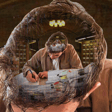
7 . AI, Nausea, Postmodernism, Social Media
I keep having more things to say about AI!
Todays episode is about psychic poisoning, depths vs surfaces, and AI art vs the human soul.
I keep talking about AI because I think the phenomenon of generative AI is illuminating something about consciousness; by automating things that we didn't previously imagine could be automated, it's revealing what cannot be automated. It's revealing an aspect of what it means to be human.
PS There's a section in the podcast about art history. My mum, Jayne Jones, is an artist and art teacher, and a lot of my art history knowledge comes from conversations with her. I only pretend to know what postmodernism means, while she has a degree in pretending to know what postmodernism means. So I'm sure she will be slightly horrified with how I've synopsized it in this episode, and I just want to say: any mistakes, distortions and oversimplifications are mine.











